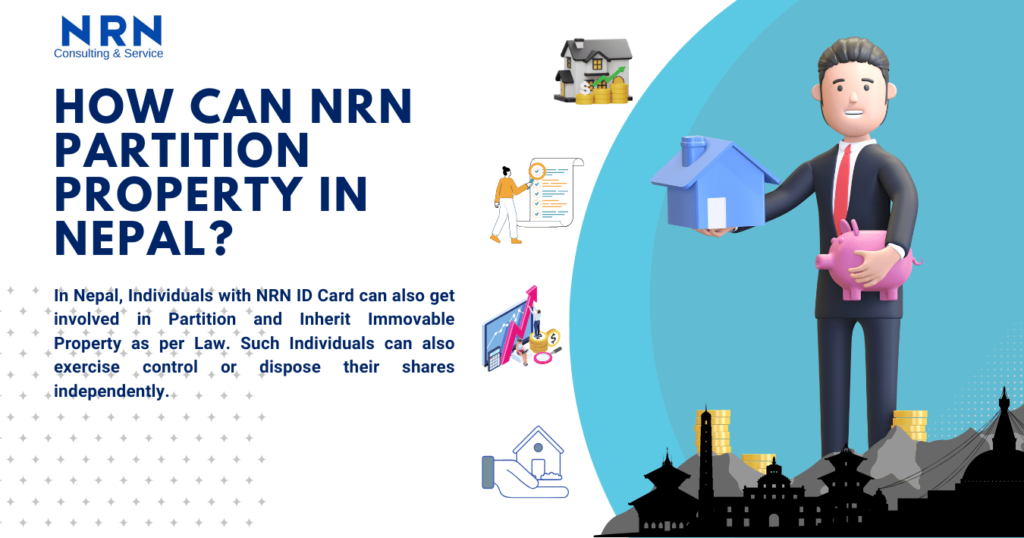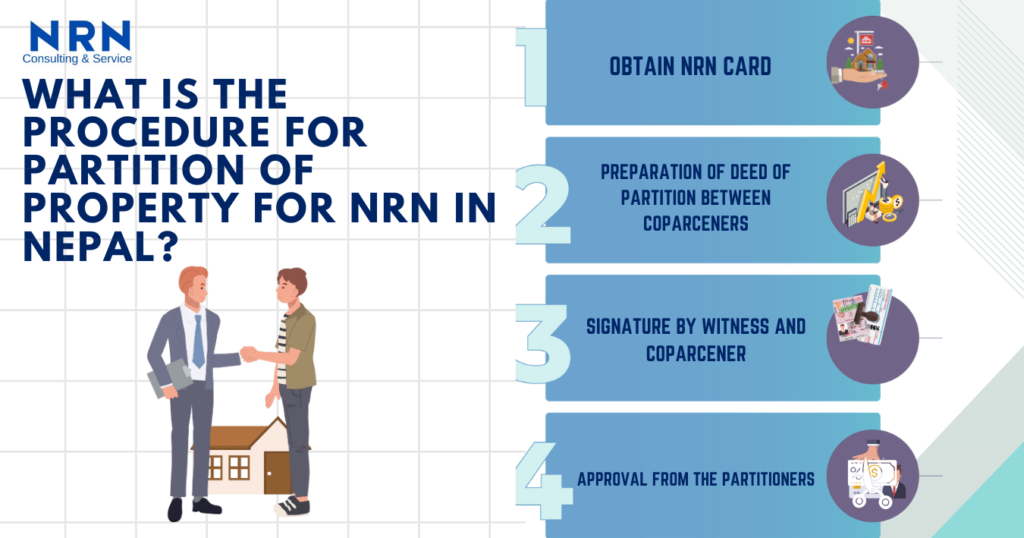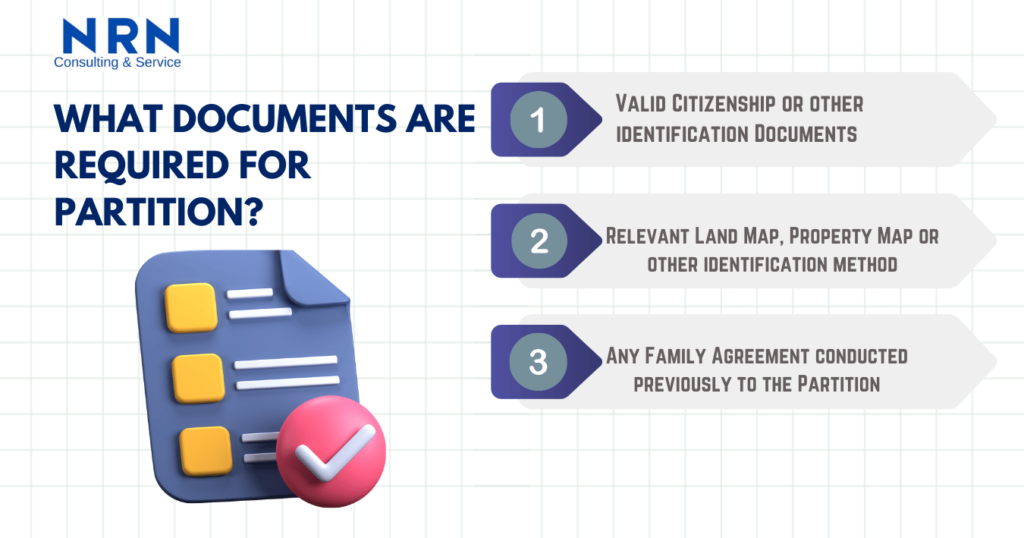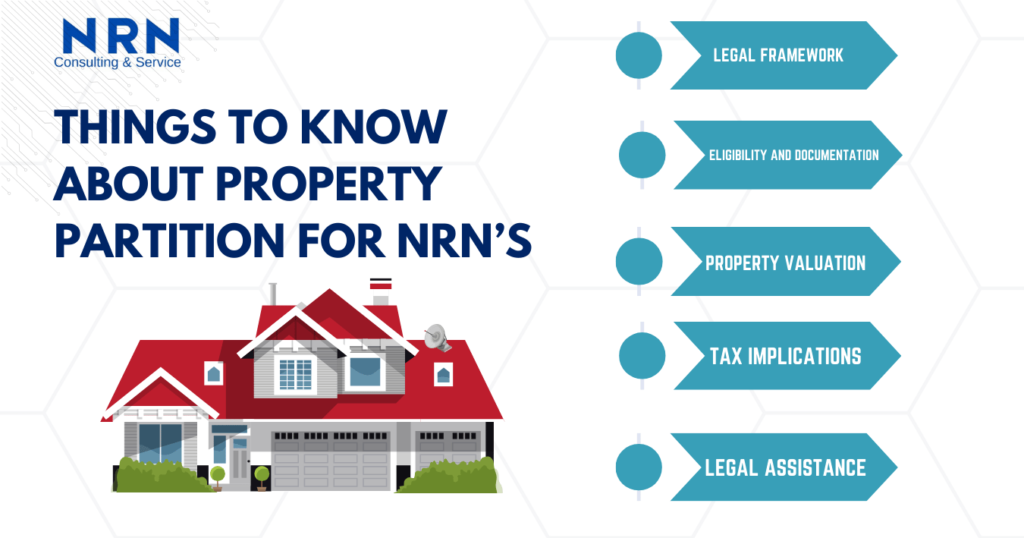NRN Property Partition in Nepal
NRN Services & Consulting provides Legal and Financial Services to Non-Resident Nepali’s interested in Partition, Succession or Inheritance in Nepal.
This Article covers the requirements for NRN Property Partition in Nepal, procedure, documents, fees, time and additional queries regarding Partition.

What is property partition for NRNs?
Property partition for Non-Resident Nepalis (NRNs) refers to the legal process of dividing jointly owned property in Nepal among NRN co-owners. NRNs, who reside outside Nepal but have ownership rights in properties within the country.
In Nepal, Individuals with NRN ID Card can also get involved in Partition and Inherit Immovable Property as per Law. Such Individuals can also exercise control or dispose their shares independently.
Can NRNs partition property in Nepal?
Yes, Non-Resident Nepali, especially Foreign Citizens of Nepalese Origin, can assert their Property rights and engage in Legal Proceedings, Partition, Succession and Inheritance. NRNs can divide jointly owned properties according to their respective ownership interests.
However, to engage in such Inheritance of Property, it is required by law for the Foreign Citizen of Nepali Origin to have held the Non-Resident Nepali Card. If the individual doesn’t hold the card, they aren’t legally eligible to hold or inherit property in any manner unless specified by law.
What is the Procedure for Partition of Property for NRN in Nepal?
Step 1: Obtain NRN Card
Step 2: Preparation of Deed of Partition between Coparceners
Step 3: Signature by Witness and Coparcener
Step 4: Approval from the Partitioners

Step 1: Obtain NRN Card
The Individual desiring to conduct Partition or subject to Partition must have a Valid NRN ID Card. If the Individual doesn’t have a Valid ID Card, the individual can get a consultation with NRN Services & Consulting or follow the procedures in the Article on NRN Card.
Step 2: Preparation of Deed of Partition Between Coparceners
Thereafter, a Deed of Partition must be executed in writing between the coparceners of Property whereby the Partition shares are equal. Both the High Value and Less Value Properties of the Partition must be effected either by consent or by Lottery. If disputes have occurred, the Partition should be effected after the settlement of the dispute.
Step 3: Signature by Witness and Coparcener
While conducting the partition, the deed of partition should be drawn up in presence of witnesses along with bear signature and thumb-impression of the Witness and the Coparcener registered in the concerned office after fulfilling the legal requirements.
Step 4: Approval from the Partitioners
The Shares of the Partition along with the Deed to be executed for Partition must be approved by the Partitioners. If the Partition was effected by balancing highly valuable and less valuable property without the Deed, and if the coparcener has already taken their share and transacted their Partition share of immovable property, then, the Partition is deemed to have been effected.
Step 5: Registration at the Land Revenue Office
Finally, the Deed of Partition must be filed at the Land Revenue Office commonly known as the Malpot Office of the respective area after which the Partition comes into effect.
What documents are required for partition?
The Documents required to conduct Partition in Nepal are:
1. Valid Citizenship or other identification Documents
2. Relevant Land Map, Property Map or other identification method
3. Any Family Agreement conducted previously to the Partition
The Things to be laid down in The Deed of Partition are as follows:
(a) List the names, ages, and addresses of each family member: the coparcener, their parents, grandparents, and grandmothers.
(b) Describe what property each family member will get.
(c) If any family member owes money or is owed money, say how much.
(d) If any family members will live together after splitting up property, explain.
(e) Make sure no one is hiding any property that should be divided.
(f) If someone will inherit property when a parent or spouse dies, explain who gets what.
(g) If someone’s share of the property will be given to someone else, explain.
(h) Include any other important details.

What is the legal process for partition?
If the Partition fails to take effect through Negotiation and the Deed of Partition cannot be agreed upon , the Partition must be brought into effect through Legal Means.
Initially, the co-owners must reach an agreement on the terms of partition or file a partition suit in court if there is disagreement. Subsequently, the court may appoint a commissioner to oversee the partition process and evaluate the property’s value.
After the valuation, the court issues a decree outlining the division of the property based on the commissioner’s report and the parties’ submissions. Finally, the partition deed is executed, and the property is physically divided or allocated to individual owners as per the court’s decree.
How to apply for property partition?
Partition of Property is usually done in consensus of the Family or through Legal Means, usually a case in the District Court. Firstly, co-owners need to reach an agreement on the terms of partition or file a partition suit in court if there is disagreement.
Following this, they must prepare and submit a partition petition along with relevant documents, such as ownership deeds, identification papers, and any agreements among co-owners.
The court then evaluates the petition and may appoint a commissioner to oversee the partition process. Subsequently, hearings are conducted, evidence is presented, and the court issues a decree outlining the division of the property.
Are there fees for partitioning property?
Yes, there are Court Fees, Legal Fees and other costs of representation and expenses for the valuation of property and other necessary procedures. However, the exact amount of Fee cannot be Referred to. Usually, the Court Fee is contingent upon the amount of property on contention which can be calculated through the Court Fee Calculator here:
How long does the partition process take?
The Complete Process of Partition, without the Court cases can be finished within 2-3 Days upon agreement of all involved parties. However, if the Partition also includes a Court Case, the time for completion of Partition becomes lengthy and can last several months to several years. In conditions where the court case is lengthy, the remaning properties without disagreement can be partitioned.
Can NRNs partition inherited property?
Yes, NRNs can partition inherited property through the NRN ID Card. However, the Coparceners of the property to be partitioned are also Foreign Citizens of Nepalese Origin, they require a NRN ID Card to inherit Property.
Are there any disputes in property partition?
Disputes commonly arise during property partition proceedings in Nepal, particularly when co-owners cannot agree on the terms of division or the allocation of shares. Disagreements may arise regarding the valuation of the property, the method of partition, or the distribution of assets among co-owners. These disputes often require resolution through negotiation, mediation, or adjudication in court.
Can NRNs partition jointly owned property?
Yes, Non-Resident Nepalis (NRNs) have the legal right to partition jointly owned property in Nepal. NRNs, whether residing in Nepal or abroad, can initiate partition proceedings to divide property they co-own with other individuals.

What are the rights of NRNs in partition?
NRNs have the same legal rights as Nepali citizens when it comes to property partition in Nepal. They have the right to initiate partition proceedings, assert their ownership interests, and participate in the division of jointly owned property.
NRNs can seek equitable distribution of assets, ensure fair valuation of property, and enforce their rights through legal channels and also have the right to engage legal representation, present evidence, and appeal court decisions related to property partition.
How to resolve partition disputes?
Partition disputes can be resolved through various methods in Nepal, including negotiation, mediation, arbitration, or litigation. Initially, parties may attempt to reach a settlement through direct negotiations or with the assistance of legal advisors or mediators. If negotiations fail, parties can opt for mediation, where a neutral third party helps facilitate a resolution.
Arbitration involves submitting the dispute to an arbitrator or panel for a binding decision. In cases where disputes cannot be resolved amicably, parties may resort to litigation by filing a partition suit in court.
Can partitioned property be sold?
Yes, partitioned property can be sold in Nepal. Once the partition process is complete and individual ownership shares are established, co-owners have the right to sell or transfer their respective shares of the property. However, any sale or transfer must comply with legal requirements and procedures, including obtaining consent from other co-owners if necessary. Additionally, partitioned property may need to be registered with the relevant authorities to reflect changes in ownership.
Are there legal advisors for partition?
Yes, there are legal advisors available to assist parties involved in property partition in Nepal. NRN Services & Consulting has expert Legal Advisors and Consultants for providing advisory services before, during and after Partition for Non-Resident Nepali. The Firm has 20 Years of Global Expertise while serving NRN’s of over 12 Countries.
What is the cost of NRN Property Partition in Nepal?
The cost of property partition in Nepal can vary depending on factors such as the complexity of the case, legal fees, court filing fees, valuation costs, and any other expenses incurred during the partition process. Legal fees may vary based on the experience and expertise of the legal advisor hired by the parties. Additionally, if parties engage in mediation or arbitration, there may be additional costs associated with these services.
Can NRNs appeal partition decisions?
Yes, upon disagreement with the Partition Deed, the decision of Partition can be appealed against and challenged in the Court of Law. If dissatisfied with the outcome of a partition suit or court decree, NRNs can file an appeal with a higher court seeking review of the decision. NRNs can engage legal representation to assist them in filing appeals and presenting their case before the appellate court.
Can partition agreements be modified?
Partition agreements in Nepal can be modified under certain circumstances with the consent of all co-owners involved. If parties mutually agree to alter the terms of the partition, they can execute an amended partition deed reflecting the revised arrangements. However, any modifications to the partition agreement must be documented in writing, signed by all co-owners, and notarized.
FAQs
What is property partition for NRNs?
Property partition for NRNs is legally dividing jointly owned property in Nepal among NRN co-owners.
Can NRNs partition property in Nepal?
Yes, NRNs can partition property in Nepal, either by agreement between co-parceners or through the Legal System.
What is the procedure for partition of property for NRNs in Nepal?
Step 1: Obtain NRN ID Card
Step 2: Prepare Deed of Partition
Step 3: Signature by Witnesses
Step 4: Approval from Partitioners
Step 5: Registration at the Land Revenue Office
What documents are required for partition?
The Documents required for Partition are:
1. Citizenship Certificate of Nepali Coparceners
2. Passport and NRN ID Card of NRNs
3. Lalpurja
4. Prior Family Agreements
5. Relevant Application Forms
6. Deed of Partition of Property
How to apply for property partition?
NRNs can apply for Partition of Property by reaching an agreement between the coparceners or filing a Partition Suit. Prepare and submit a petition, and follow the court's process.
Are there fees for partitioning property?
Yes, fees include court fees, legal fees, and valuation expenses, which vary based on the property's value.
How long does the partition process take?
Without disputes, it takes 2-3 days; with court cases, it can take several months to years.
Can NRNs partition inherited property?
Yes, NRNs with an NRN ID card can partition inherited property in Nepal.
